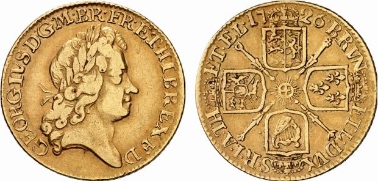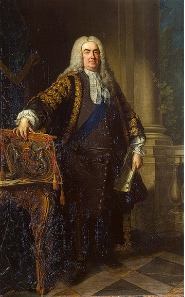by Björn Schöpe
courtesy of Barbara Balz / World Money Fair
In the summer of 1720, the economic bubble burst. The South Sea Company had promised lucrative returns. The value of their stocks was soaring; various lords and King George I invested, as well. But the company did not make any profit. Its breakdown led to the ruin of formerly wealthy members of the aristocracy. The king, however, had sold his shares in time and even earned profits. As a matter of fact, this did not make him popular with his subjects. Someone else was to be the hero to save the nation: Sir Robert Walpole consolidated the shaken finances of the state. By doing so, he became a potential rival for power to King George I.
George I (1714-1727). Guinea 1726, London. Seaby 3633. From Künker auction 139 (2008), 7575.
This golden guinea bears the effigy of the English sovereign, King George I – with flowing curly hair, on his head the laurel crown, telling of power. Next to the British emblem on the reverse, the abbreviated additional legend calls for our attention: “Duke of Brunswick-Lüneburg, Arch-Treasurer and Prince Elector of the Holy Roman Empire”. In fact, the English king was from Hanover, a German principality. Queen Anne had designated him as successor, ignoring the claim of the Catholic Stuarts. Naturally, the English were not happy that a foreigner should be their king, but getting a Catholic king would have been even more to their dislike.
But George’s conduct drew criticism in Protestant England. Already on his first visit, the king brought his mistress. The marriage to his wife had been annulled. Moreover, he made frequent visit to his native Hanover. And even though today it is a proven fact that, apart from German, he spoke four languages – Latin, French, Italian and English –, a rumour persists that he never properly learned the language of his subjects. In addition, he was in a permanent conflict with his own successor, George August.
Thus, it is not surprising that James III, the Stuart pretender, repeatedly dared to stir up rebellion among the British subjects.
England’s Prime Minister Sir Robert Walpole. Studio of Jean-Baptiste van Loo, 1740. Source: Wikipedia.
The crash of the South Sea Company put an end to the autocracy of the king. He was forced to accept the position of a prime minister, although the term only gained common usage around 1730. Sir Robert Walpole was the first to hold this office. He managed to push the king to withdraw from the government. From then on, not the monarchs but the prime ministers would shape the policies of Britain.
The German King of Britain died in 1727, not in England but on a visit to his former home in Osnabrück.
This article was written for the catalogue of the World Money Fair 2012 whose Guest of Honour was Great Britain. More on the World Money Fair 2012 you can read here.





